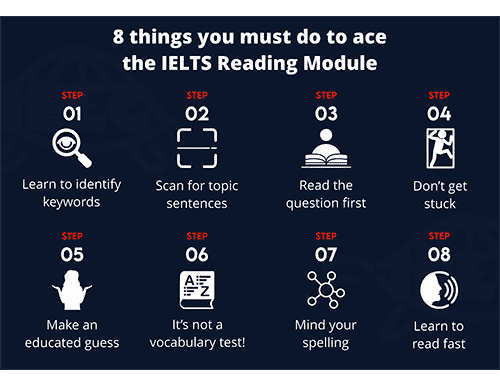
10 things you must do to ace the IELTS Reading module!
Greetings, IELTS warriors!
Today, we are going to talk about the Reading Module!
For many, the Reading Module is such a dreaded task – the long texts, the difficult vocabulary, the limited time and the required concentration… just thinking about it can make one shudder!
Worry not, we will give you the tips and tricks you need to get a high score in your Reading Module!
If you need a deeper discussion, you can take our IELTS course here.
But first, let’s review what the IELTS Reading Module is all about, shall we?
The Reading Module is an hour long. There are 3 passages and 40 questions. You will not get any additional time to transfer your answers to the answer sheet.
The Reading Module is intended to assess your ability regarding some reading skills, including reading for gist, reading for main ideas, reading for detail, skimming, understanding logical argument, and recognising writers’ opinions, attitudes, and purpose.
Academic IELTS uses academic texts – think scientific articles. Whereas General Training IELTS use texts that you can find on a day-to-day basis such as newspaper, advertisements, handbooks, and notices.
There are several types of questions in IELTS Reading Module that you should prepare for, namely:
- Multiple choice question
- Identifying information
- Identifying a writer’s view/claim
- Matching information
- Matching headings
- Matching features
- Matching sentence endings
- Sentence completion
- Summary, note, table, flow-chart completion
- Diagram label completion
- Short-answer questions
Phew, that’s a lot! And you only have 60 minutes to read three long passages and answer 40 questions! Honestly, it’s understandable if you think that’s an impossible endeavour. We would too if we come unprepared and not knowing the tips and tricks to ace it!
But, that’s what we are here for!

Now, let’s look at the tips and tricks you need to ace the IELTS Reading Module!
1. Learn to identify keywords
Each question will include keywords that will aid you in locating the answer.
Alternatively, depending on the type of question, the keywords might appear among the response options.
A keyword conveys information about the main idea. Learning how to scan for them will save you a lot of time.
Key words rarely provide the actual answer, but they might point you in the right direction. Then locating the actual answer will be much easier.
Numbers, dates, and names are the most obvious key words and the easiest to identify. Others should also be quite obvious, and will likely be nouns or verbs.
However, synonyms are frequently used, so keep an eye out for these as well.
2. Scan for topic sentences
Similar to the first point above, locating topic sentences will also make it easier for you to find the correct answer.
Not everyone can read fast, especially not in a foreign language – and that’s completely okay! That’s why you should learn how to scan!
Scanning is a reading technique that helps you find information more quickly. You no longer have to read anything word for word. Simply move your eyes across the text in a wavelike pattern. You don’t pause to read details, and you don’t spend time on irrelevant information. This is an excellent way for understanding the main points of a text and locating the information you’ll want to read in greater detail.
When you truly want to understand a text, you must understand what each paragraph says. The main idea of each paragraph is stated in the topic sentence. You don’t have to read all of the details, which is fine because most of them aren’t required to correctly answer the questions. The information in the topic sentence is all you truly need to understand each paragraph.
Alright, now how do I find the topic sentence?
The topic sentence is most often found at the start of a paragraph, However, in some instances, it might be located in the middle or at the end of the paragraph. It’s fairly easy to identify them – they usually sound like some sort of announcement. Something like “Electroreception comes in two variants.” We can safely assume that the subsequent sentences will talk about the two variants in more detail.
Scanning can also help you locate keywords much more quickly!
3. Read the question first, the passage second
When you begin reading, you should have a few questions in mind. Otherwise, you’ll read the text first, then the questions, and then the text again. You’ll just end up reading the texts too many times, something you just do not have time for. Before you begin reading, read the tasks and questions, then consider the information you’ll need to locate to answer those questions.
4. Don’t get stuck
The IELTS Reading Module is meant to measure English skills across a wide spectrum, so the questions will undoubtedly vary in difficulty. Some will be simple enough for anyone with moderate English fluency to score, while others will be extremely difficult, with only advanced English users likely to answer correctly.
Don’t be alarmed if you come across really difficult questions. Take your shot at them, then move on.
You will waste crucial exam time if you spend a lot of time on questions that you find tough. You won’t be able to answer all of the easier questions, and you’ll lose points as a result! If you don’t know the answers to some questions, skip them and move on. This allows you to concentrate on all of the questions that you do know the answers to. If you have time, you can return to the tough questions after you have answered all of the other questions.
5. If you don’t know the answer, guess!
If you really don’t know or cannot locate the correct answer, just make an educated guess! For example, suppose you are faced with a multiple choice question with 4 possible answers. You already know that two of those answers are incorrect, so you should choose an answer from the remaining two. There’s a 50-50 chance that your answer will be correct. That’s not bad!
Even if your answer turns out to be wrong, no mark will be deducted. So, there is really nothing to lose. Might as well guess!
6. Remember, it’s not a vocabulary test!
There is a really high chance that you will encounter some unfamiliar vocabulary. That’s totally normal! Even native speakers encounter unfamiliar words sometimes. You are probably also unfamiliar with some Indonesian words, right?
Rather than being a vocabulary test, the IELTS Reading Module wants to see your ability to understand contexts, not words.
Even if you don’t know the meaning of a word (or two, or five!) you should be able to interpret the overall meaning of the text. Remember, minuscule details are not important as long as you understand the big picture.
Of course, it’s still important for you to practice reading every day and enhance your vocabulary. The IELTS Reading Module often uses synonyms, so if you know the synonyms of many words, it would be advantageous for you. But don’t stress if you encounter an unfamiliar word, it’s not the end of the world!
7. Mind your spelling
Even though this is not the Writing Module, always double check your answers – especially in regard to spelling! Unfortunately, just a small typo will make your answer counted as incorrect, even though your answer might be technically correct.
For example, in the “True, False, or Not Given” section, if you write “treu” instead of “true”, then say bye bye to your precious mark! Remember, even just one typo can cost you your IELTS target score!
So, beware of typos! It would be such a shame if you lose marks for such a silly mistake!
8. Learn to read fast
Unfortunately, there is no hack around this one.
You simply need to read more!
Make reading a habit. You don’t even necessarily have to read all academic-heavy, IELTS related texts. Give novels or non-fiction books a try!
This will help you read quicker and expand your vocabulary. Of course, it’s still a good idea to practice with texts akin to IELTS Reading Module passages, but to evoke enjoyment in reading so you are more likely to practice everyday, balance it out with reading things that you actually enjoy too!
9. Cross out incorrect answer to narrow down your choices
By eliminating clearly wrong answers, you can focus on the more likely options, making your final choice more informed and less overwhelming. This helps organize your thoughts and clarifies your reasoning, as you actively engage with the material to determine why certain options are incorrect. Once improbable answers are eliminated, it saves time by not having to re-read or reconsider these options.
However, it’s important to use this strategy with caution. Ensure that you’re not hastily eliminating options without proper consideration, as sometimes the correct answer may not be immediately apparent. Also, be aware of the context and nuances in the reading passages, as IELTS often includes tricky questions where answers might not be straightforward!
10. Practice under real test conditions
The IELTS reading test requires sustained concentration. Practicing under real test conditions helps build the endurance needed to maintain focus throughout the entire duration of the test. Practicing under real test conditions also helps you learn how to allocate your time effectively across different passages and questions, a crucial skill for the actual test! Timed practice helps identify which types of questions or passages take more time, allowing you to focus your preparation on these areas.
Moreover, you can experiment with different strategies (like skimming and scanning, or reading questions first) to see what works best for you within the time limit!
Summary
In this article, we’ve shared the 8 tips you need to know to ace the IELTS Reading Module. The Reading Module might sound scary, but with sufficient practice, you should be able do it without too many difficulties. Of course, we are always here to help! :)
NEXT STEPS
Do you want to achieve your IELTS target?
We just shared the tips and strategies you need to ace IELTS Writing Task 1. Armed with these strategies, you can take the first step on the road to achieve your dream IELTS score.
But if you want to guarantee success in your IELTS test…
And
You’re tired of wasting time and money on strategies and courses that don’t work…
And
You’re confused on which IELTS course to take….
Then check out our Indonesia’s best IELTS preparation course to achieve your target IELTS score and embark on the next chapter of your life!
IELC has the best track record in Indonesia for helping our students achieve their IELTS target and we will use our experience and expertise to make sure you will achieve your target too!
P.S. If you are curious about your IELTS score, contact us about our simulation tests complete with feedback for writing and speaking tests!
Sincerely,
Anthony McCormick
IELC Managing Director
